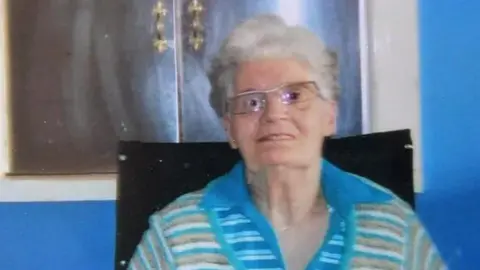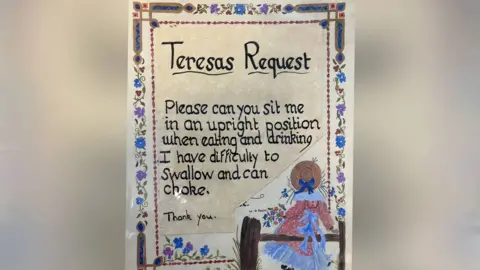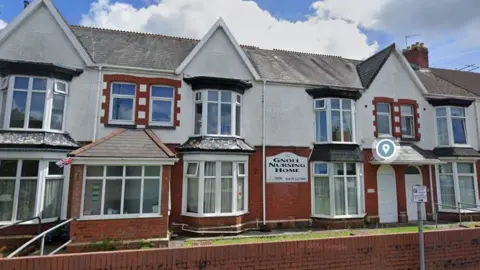Neath: Woman's death re-examined after care home feeding claim
 Family photo
Family photoA new inquest into a 85-year-old's death has heard she may have suffocated on food despite care home staff being given guidance on how to feed her.
A previous review of Teresa May Pokoyski's death found she died from pneumonia.
But her family appealed after an expert found key details were missed at an inquest.
The family say they were told by care staff it was easier to feed her in bed because the home was understaffed.
Mrs Pokoyski was completely dependent on her family and then on care homes for daily care after a severe haemorrhage at the age of 33 and strokes in later life.
Her condition meant food had to be pureed as she had difficulty swallowing.
On Friday, South Wales Central Coroner's Court in Pontypridd heard a witness statement from Mrs Pokoyski's daughter, Frances Ryan, who said she told the home her mother needed pureed thick food and she should not be fed on her back.
The family recorded two incidents when she choked - one when her dentures slid down her throat, and on another occasion when she was given tablets in a reclining position.
 Family photo
Family photoMrs Pokoyski's other daughter, Diane Hopkins, said her mother turned blue after one incident leading them to put a sign up with feeding guidance.
They asked staff at Gnoll Nursing Home in Neath that she ate in her wheelchair at a table and it was agreed that she would be fed by a senior carer from then on.
Mrs Pokoyski died on 21 October 2012.
In the original inquest in 2016, it was determined Mrs Pokoyski died from pneumonia caused by locally advanced adenocarcinoma - a type of cancer - of the lung.
A new inquest was opened this year after her family received independent expert advice showing that food found in Mrs Pokoyski's lungs - in different stages of being broken down - indicated aspiration through feeding.
Aspiration is when foreign material is inhaled into the airway and can cause asphyxiation.
Independent pathologist Professor Elizabeth Soilleux said this pointed to long-standing aspiration pneumonia on many occasions, and not just the day before her hospital admission.
The coroner heard this suggested the care home had not been following feeding guidelines given to them by speech and language therapists.
Friday's inquest heard that Mrs Pokoyski's family were concerned the previous inquest in 2016 had put too much emphasis on lung tumours.
They were more worried that Gnoll Care Home, who was in charge of Mrs Pokoyski's care, had not been following feeding guidance.
 Google maps
Google mapsPathologist Dr David Hywel Thomas - who also gave evidence at the previous inquest - noted there was food in Mrs Pokoyski's lungs, but said he could not confirm if that was due to feeding or the patient's inhalation of vomit.
Giving evidence on Friday, Dr Thomas said he had originally put too much weight "on the absence of giant cells" found in Mrs Pokoyski.
He said this "affected the degree of confidence" in whether Mrs Pokoyski had died from aspiration pneumonia.
Mrs Pokoyski was admitted to Morriston hospital on 18 October, 2012, following a report she had aspirated on her vomit the previous day.
Julia Kendrick KC, on behalf of Gnoll Nursing Home noted that despite the vomiting incident, the patient was not short of breath the previous day.
The inquest continues.
